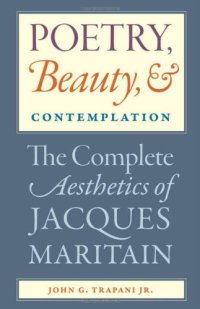
Ebook: Poetry, Beauty, and Contemplation: The Complete Aesthetics of Jacques Maritain
Author: John G. Trapani Jr
- Tags: Theology, Angelology & Demonology, Anthropology, Apologetics, Catholic, Christology, Creationism, Ecclesiology, Ecumenism, Eschatology, Ethics, Fundamentalism, Gnosticism, Historical, Liberation, Mysticism, Pneumatology, Process, Prophecy, Protestant, Salvation Theory, Systematic, Reference, Almanacs & Yearbooks, Atlases & Maps, Careers, Catalogs & Directories, Consumer Guides, Dictionaries & Thesauruses, Encyclopedias & Subject Guides, English as a Second Language, Etiquette, Foreign Language Study & Reference, Genealogy, Quota
- Year: 2011
- Publisher: The Catholic University of America Press
- Edition: 0
- Language: English
- pdf
Twentieth-century French Catholic philosopher Jacques Maritain is arguably one of the most significant contemporary disciples of St. Thomas Aquinas. Maritain's philosophy is rooted in and logically consistent with the thought of his mentor, yet his philosophy is profoundly original. Taken together, his comprehensive metaphysical principles, his philosophy of human nature, and his insights on art and creativity combine to create a complete explanation of his aesthetics.
Poetry, Beauty, and Contemplation provides a basic introduction to, and an extensive examination of, Maritain's philosophy of art and beauty. The book begins with a brief biographical sketch of Maritain's early years, including the early influences on his philosophy (Henri Bergson and Thomas Aquinas among them). The author explores key terms and ideas central to Maritain's aesthetics -- intuition, connaturality, Poetry, and beauty -- and traces their historical development. The book integrates the inherent relationship between Maritain's unique understanding of "Poetry," his aesthetic and metaphysical ideas about beauty, and his explanation of the distinction between natural and supernatural contemplation, resulting in a complete exposition of Maritain's aesthetics.
ABOUT THE AUTHOR:
John G. Trapani Jr. is professor of philosophy at Walsh University. During his 36 years at the university, he has served as chair of the Philosophy Department and Humanities Division and is the founder and director of the university's annual Philosophy-Theology Symposium, now in its 35th year. The current president of the American Maritain Association, John has written extensively on Maritain's philosophy and is editor of Truth Matters.
PRAISE FOR THE BOOK:
"A thoroughly engaging and intensive study of Maritain's philosophy of art, artwork, beauty, and contemplation. This work does justice to Maritain's depth as a philosopher. His rigor, erudition, and persuasiveness shine throughout John Trapani's exposition. The reader senses on every page that Trapani is a master of the subject, a sure guide to fresh insights and reflections on Maritain."--Curtis L. Hancock, Professor of Philosophy, Rockhurst University
"Could it be that the world will be saved by beauty? Dostoevsky claimed as much. Aleksandr Solzhenitsyn thought so, too. But what is a Thomist to think? John Trapani, in his welcome study of Jacques Maritain's aesthetics, helps us come to terms with Dostoevsky's question. Trapani shows that we can only make headway when we see that the primary analogate of aesthetic beauty, proportioned in so many creative modes to our experience, is the transcendental beauty that is the face of God."--James G. Hanink, Professor of Philosophy, Loyola Marymount University
"In search of a language for the experience of beauty, poets, painters, and scholars continue to turn to the writings of Jacques Maritain. Those seekers now have a sure guide. Trapani's study of Maritain's aesthetics is clear, cogent, and comprehensive. We are in his debt."--Thomas Hibbs, Honors College Dean and Distinguished Professor of Ethics and Culture, Baylor University
"John Trapani has struck gold. . . . A detailed treatment of Maritain's aesthetics has long been necessary. . . . Trapani demonstrates that Maritain's vision, however elusive, can be mapped. Indeed, Trapani provides an elaborate and helpful chart that outlines the changes and continuities in Maritain's technical vocabulary throughout his wide-ranging career. . . . [T]he particular strength and importance of Poetry, Beauty, and Contemplation rests in Trapani's ability to show how Maritain's aesthetics have significance beyond strictly philosophical or theological domains. Poets and artists, literary and art historians, and lovers of poetry and art will find in Trapani's study of Maritain a satisfyingly spacious and clear but non-reductive acco